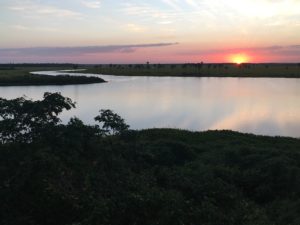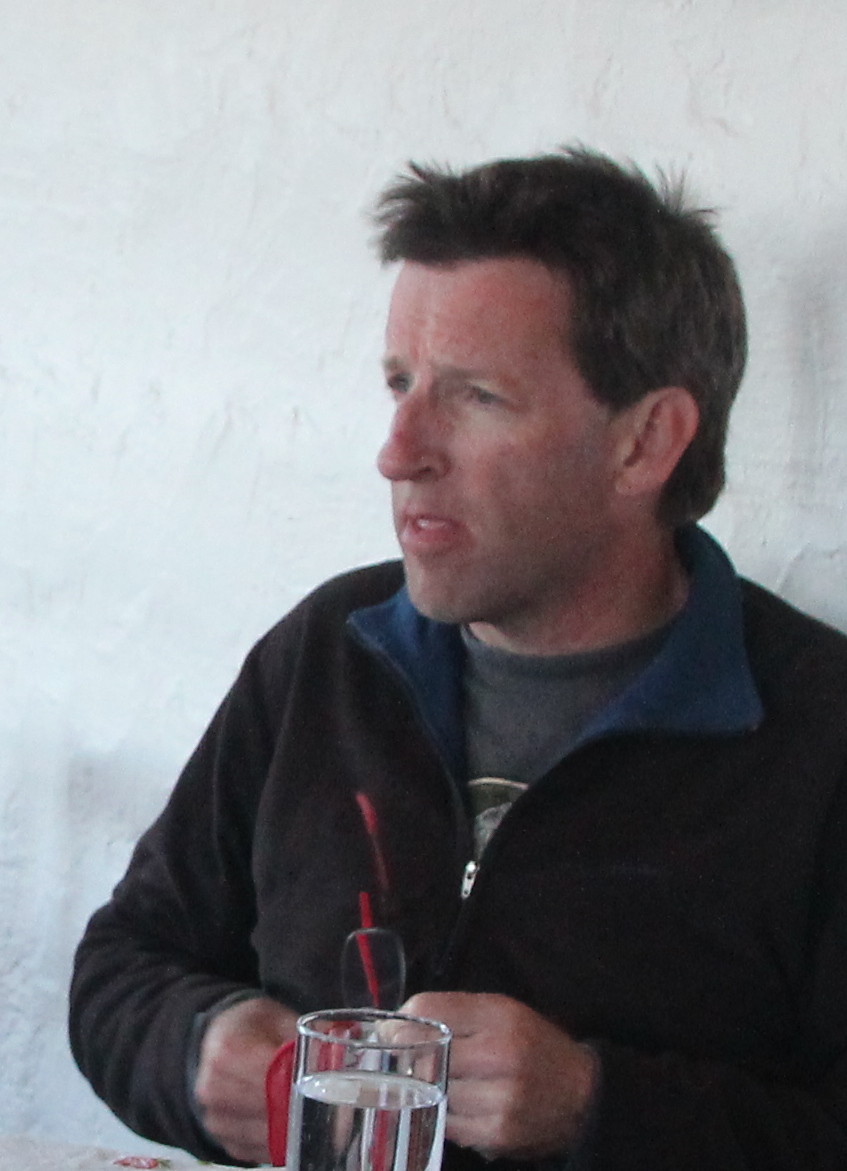A few mornings after returning home I wake up from a dream of Spanish. Not in Spanish, which is an idealistic beginner’s aspiration, but of: the entire language had become a dense tangled mass of plants, a vegetative riot rich with exclamations, scraps of conversations and whispers, and though most of the sense remained murky to me, here and there I could clearly identify words or phrases, leaving me with a passing sense of accomplishment and a hunger for more.
It was no wonder, because one of the most memorable moments of my trip to South America came atop a wobbly observation tower in the Paraguayan Pantanal, where two photographer friends and I watched the dawn arrive among clouds of mosquitoes. When the sunlight came it painted a landscape of undulating marsh grasses and tree tops, a richly textured wadding of endless variations of green that buzzed and trilled and squawked with birds. In the midst of that infinitude of leaves I had about as much chance of identifying, or even catching a glimpse of, all those birds as I did of following all the complicated tense changes of irregular verbs in a run-of-the-mill conversation.
Since arriving in Paraguay and commingling grammar and conversation lessons with a few birding outings, it had been obvious to me that learning a new language and the natural history of a new place involve much the same process. Both involve a convoluted mix of the familiar and the utterly strange. We joked in class about how you can take almost any English adverb that ends in –ly, replace that ending with –mente, and come up with a perfectly serviceable Spanish equivalent. And out in the marshes beyond Asunción it was possible to see birds that were identical to or very similar to those around here: white herons, blue and rust-colored kingfishers, gray and yellow flycatchers. That woodpecker picking ants off the ground? I can tell it’s some kind of a flicker. Exactamente!
But those moments of comfortable recognition were more often swamped by the feeling of being at sea, washed over by waves of unknowing and subject to all sorts of embarrassments. Shoot, in my efforts at basic conversation with my host family I think I just said that I’m a little bit married, rather than tired. Did I just explain that my son back home is 13, or 30? And—so often—What is it that person just asked me? I have no idea at all. It was a relief then to go outside somewhere and look for birds, which, according to the field guide, all carry at least three common names—the Spanish, the English and the Guarani, the indigenous language of much of Paraguay—but which appeared entirely indifferent about which I used. Here too I was a naïve and sometimes embarrassing companion. Look at that! I’d exclaim at the sight and sound of a pair of tero-teros, loud and flashy shorebirds that were almost ubiquitous. It was like growing excited at the sight of yet another raven in Arizona.
I knew there were a lot of birds in the Pantanal, which is an immense swampy wetland in Paraguay, Bolivia and Brazil that at the end of the rainy season sprawls to about two-thirds the size of Arizona, and going there was the culmination of my trip. It was about the remotest place I’ve been. Getting there involved not only the obvious plane travel, but an 18-hour drive on mainly dirt roads subject to dissolving without notice into either gaping holes or expansive dust pits that, when you entered one just as a speeding livestock truck was coming the other way, exploded into billowing clouds that made continuing forward at any speed an act of commingled faith and terror. And then there was the boat ride, a breeze by comparison, 15 miles up two different rivers until at dusk we arrived at a densely tangled bank from which we had to use our flashlights to work our way through the brush to our bunk beds.
The next morning, up on the observation tower, I realized that I’d never know what most of the birds were that I heard calling all around. And for the most part I didn’t care. Much of what makes travel appealing to me is the sense of feeling like a stranger in a place, the knowledge that, no, I’m not from here, and I don’t know the details. What I do know, instead, is the valuable fact that the world is large and strange and therefore interesting.
Just knowing individual details, anyway, is a chore and ultimately a bore. Sheer memorization is no way to learn a language or a set of birds. Time and again I found myself straining to understand my way through someone else’s sentence, translating word by word, my mind frantically trying to recall which verb that was, and which ending, which then would tell me who the subject was, and by then the conversation had moved on. Fluency, this was not. Fluency is knowing the patterns well enough that meaning comes right away. It’s going to take a lot more exposure to Spanish, a lot of raw practice, to get there. If I ever do.
For the Pantanal, I don’t expect any fluency. I’ve poked around northern Arizona long enough to know that it takes a long time to get a deep sense of the patterns: the weather, the arrival dates of migratory birds and tourists, the way the plants and insects behave differently in different years. Who am I, a short-term visitor, to know much of anything about the giant river otters, the caymans, the various parakeets and forest hawks—to say nothing of the larger patterns that govern how much the river floods every year, and what grows where as a result, and how that might be altered by how people are raising cattle there or soybeans or ecotourist lodges?
That would be fluency with a place, which demands time.
That’s not what travel is for. Travel, in the end, is to remind us of the worth of knowing the patterns of home.
Which is why one of the most memorable encounters I had in Paraguay wasn’t some exotic parrot or jungle cat or even the howler monkeys that I saw later that same morning thanks to a well-versed local guide.
No, it was that while studying in the courtyard of the house where I stayed in the city I heard, on the gutter above my head, a sound that exactly summarized for me the experience of sitting outside in a garden: it was a house wren, the same kind of unassuming bird whose chattery song enlivens our patio each May.


